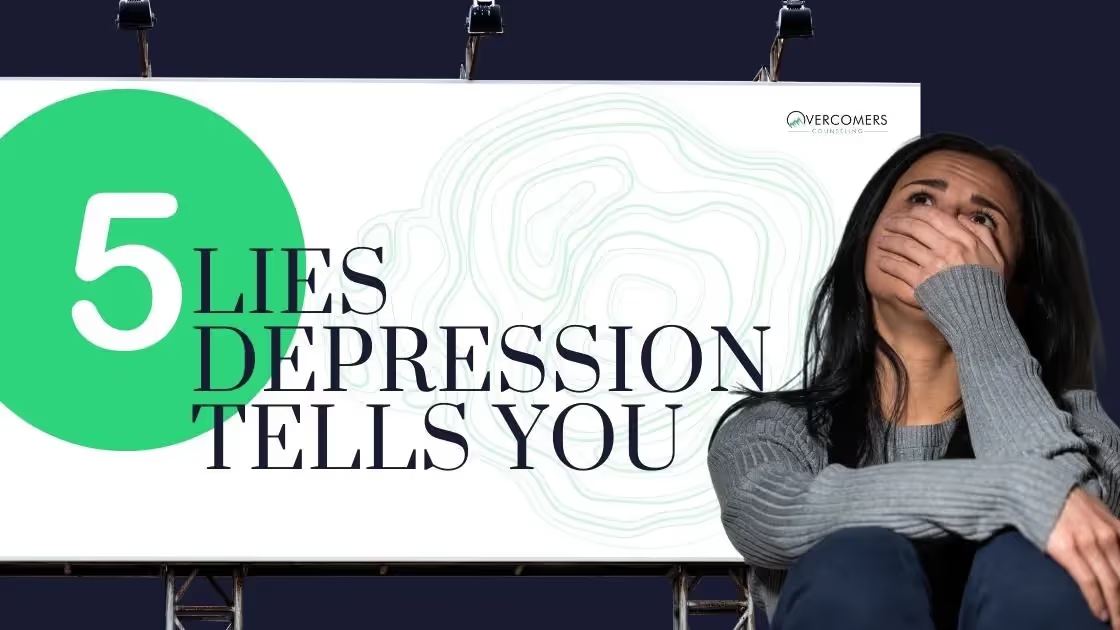Many of us who experience depression know that our thoughts often send us into a spiral; it starts from something small but loops into a big yarn that seems...

Many of us who experience depression know that our thoughts often send us into a spiral; it starts from something small but loops into a big yarn that seems challenging to untangle. These thoughts, which are often negative, are called 'Cognitive Distortions or Beliefs' and are based on the work of Aaron T. Beck's Cognitive Therapy.
These thoughts or beliefs are not exclusive to depression, and everyone experiences these from time to time.
However, constant negative thoughts like "I'm not good enough, or "I'm not loveable" definitely contribute to one's Depressive moods.
These thoughts often become a part of us, but it's important to remember that they are the lies that depression tells you.
There are 5 most common cognitive distortions when it comes to depression.
Although it is a good practice to identify and understand these beliefs, overcoming these in the care of a professional is always recommended.
This particular lie that depression tells us goes by many names.
Black-or-white thinking, dichotomous thinking, or even polarized thinking suggests that one cannot see a grey area.
These thoughts might sound like this:
"I'm not good enough," or "I'm perfect at everything."
"Everything around me is getting destroyed," or "Everything around me is splendid all the time."
"Others always leave me behind."
"I will never find love"
These are the lies that depression tells you, especially the all-or-nothing thinking, which makes us feel hopeless, and on the verge of giving up. Sometimes, it is alright to be somewhere in the middle.
Thus, instead of thinking that you're either a failure or perfect, your self-talk could be something like, "I know I'm okay at this... and maybe with time, I will become better."

Among the lies that depression tells you, one comes in the form of "should statements."
"You should be able to do that."
"You're so stupid... you should never have said that"
Sound familiar?
That's because 'shoulds' create high standards for ourselves, and when we don't achieve them, we feel worthless or even like a failure.
Identifying 'Shoulds' directs you to monitor your self-talk and make goals and expectations that are more manageable and compassionate to yourself.
Our brains process a lot of information every day, every hour, and every single second!
However, the brain, too, has limited capacities for storage.
Thus, it filters out information and keeps the necessary stuff for us.
However, the lies that depression tells us make us exclude or filter out the positives of many things and focus on that one tiny detail or data that becomes like a dark cloud over our heads.
Mental Filtering can look like a class presentation when everyone praises you. Still, one constructive criticism from your professor is the only information to store, and your focus goes away from the positive.
Given that this might be more individualistic and differ from person to person, the recommendation is that you care for this though in the presence of a safe space and person.

Personalization is one of the lies that depression tells you that is most convincing.
"My partner seems unhappy today... it must be because of me."
"My boss has it out for me today... it must be because I'm a lousy worker."
"Those kids in the subway were laughing... they must be laughing at me."
Although we are the main characters in our stories, a lot of things we take personally are seldom to be taken as our own.
It is possible that your boss is having a bad day, your spouse has a significant deadline, or even the kids are not talking about you.
Emotions are an amazing guiding tool for us. They tell us when something is wrong internally or externally.
As human beings, we use many of our mind and body's resources which includes both emotions, making meaning of those emotions, and our rational thinking.
Emotional Reasoning is a cognitive distortion that suggests that emotions dictate our reason. Thus, if you believe something is true based on your emotional response, facts or objectivity often don't seem relevant.
Thoughts like, "I feel helpless. I must be helpless," or "I am depressed. I must be so weak."
While understanding and acknowledging emotions are important, it is not necessary to accept them as facts.
Simply put, if you feel helpless, it isn't necessary that you are helpless. It could also mean that you are yet to find the right resources that could help you.
The lies that depression tells you don't always start with depression alone. It is often seen as a vicious cycle of thoughts contributing to depression, feeling depressed, then thinking more negatively, thus, feeling more depressed.
However, once you identify these lies, you have the power to not listen to the lies that depression tells you.
A simple thought log that puts your thoughts on trial may be helpful, and you can access it below.
Please note that although this may prove to help you, sometimes the reasons for our woes go deeper, and you may benefit more from seeking a therapist who specializes in the difficulties that you may be facing.
https://www.therapistaid.com/therapy-worksheet/challenging-negative-thoughts
Yes! There are many effective natural remedies that may be beneficial in managing depressive symptoms, such as participating in regular physical activity, changing your diet, getting adequate sleep, practicing relaxation techniques like yoga or meditation, journaling about your feelings/thoughts/emotions, seeking out social activities/support groups with other individuals struggling with similar issues
Depression is a mental disorder (a common one) that affects millions of people worldwide. It is characterized by persistent feelings of sadness, hopelessness, and loss of interest in activities once enjoyed.In this section, we will discuss the various types of depression, including major depressive disorder, persistent depressive disorder, and bipolar disorder.Gaining a deeper understanding of your depression is the first step in finding the right treatment and support.
If your symptoms of depression have been persistent and interfere with your daily life, it's important to seek help from a mental health professional. It's also a good idea to get medical advice if you experience any thoughts of self-harm or suicide.
Yes! In fact, it's encouraged that you open up to your therapist so they can gain deeper insight into your individual situation and develop the most effective treatment plan possible that works best for you. Your therapist is there to serve as an unbiased source of support who will respect any thoughts or feelings shared within the session without judgment or criticism.
Therapy provides many benefits for people battling depression. Research has shown that cognitive-behavioral therapy (CBT) is particularly effective in managing depressive symptoms. In addition, therapy can teach healthy coping skills and provide emotional support during difficult times. It may also be used as part of a comprehensive treatment plan which includes medication as well as lifestyle changes such as regular exercise and improved nutrition.
The duration of depression counseling varies for each individual, depending on the severity of their depression and their progress in therapy. Our therapists will regularly assess your progress and adjust your treatment plan as needed.